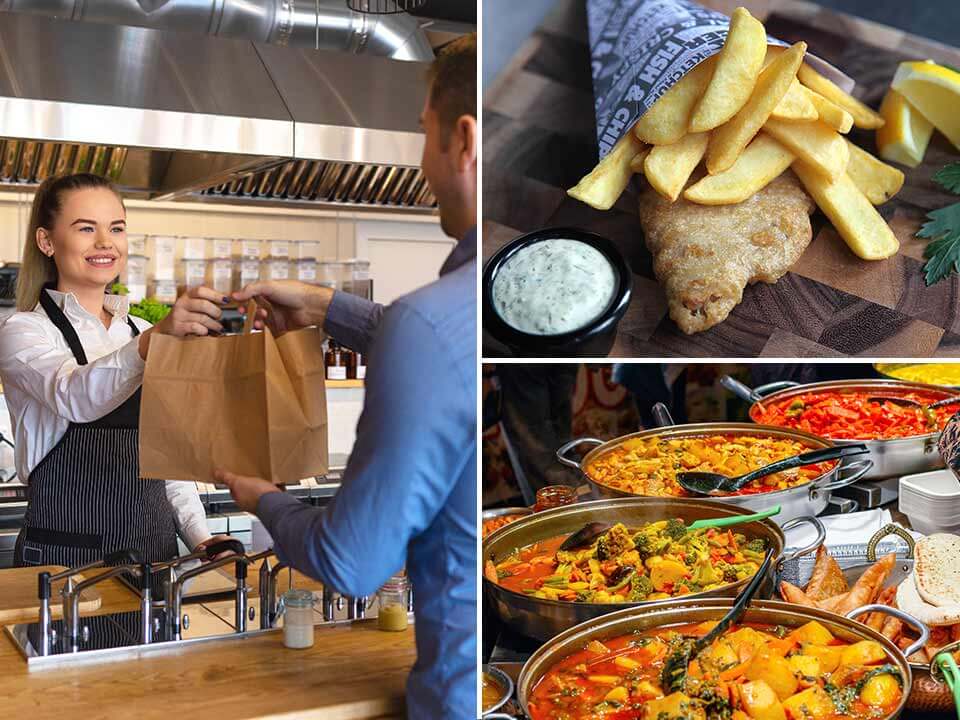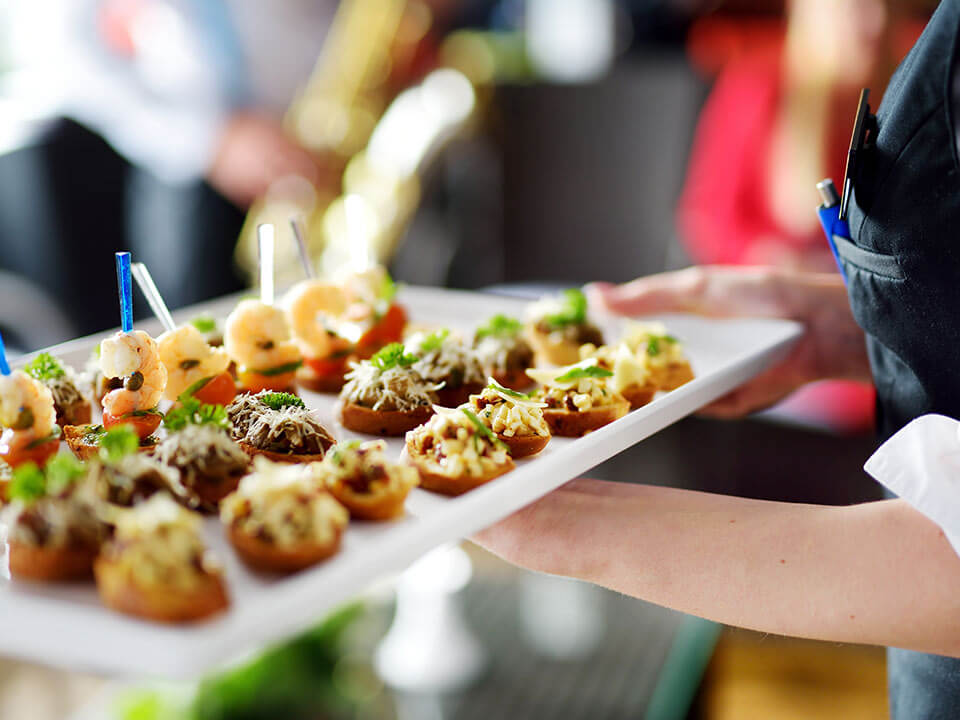Insurance for a food business
Join over 900k UK customers – we offer public liability cover from £4.74*
Get tailored quotes in 7 minutes

Compare quotes from leading brands






Rated 4.8/5
Based on 39,800 reviews
Claims paid in 24 hours
For 80% of settled claims
Why is professional food insurance important?
Whether it’s an allergic reaction or a slip in your kitchen, accidents happen to the most experienced food professionals. Claims for food liability can cost thousands, so a food insurance policy usually provides flexible cover for public and product liability, alongside employers’ liability, buildings, contents, and stock cover, for claims which could put the brakes on your business.
- food business insurance, UK customer service and claims team
- trusted by over 900,000 small UK businesses for flexible, tailored cover
- food product liability insurance between £1 million and £10 million
What does food liability insurance cover?
We’ll start with food liability insurance, including public and product liability, covering you against accidents caused by your business or claims against your products – for example, if someone suffers an allergic reaction to an ingredient you’ve used. You can also include insurance for employees, stock, and contents, plus personal accident cover for you or anyone else you’ve covered.
This content has been created for general information purposes. Make sure you have the right level of business insurance by checking your policy documentation for details. Read our full Terms and Conditions
Insurance for selling food – how much does it cost?
Find out how much you’ll pay by comparing prices from a range of trusted insurers. You choose what goes into your policy, so you only pay for what you need.
Prices start from £4.74 per month
Get your quotes in 7 minutes – prices are guaranteed for 30 days.
Get your tailored quotes in 7 minutes
The price is for up to £2 million of public liability insurance – 10% of customers paid £56.82 or less annually between 1st Jan – 31st May 2024. Equivalent to £4.74 a month (and excludes the extra costs for paying monthly). 76% of customers have a £1 million limit and 24% £2 million. If you complete a quote, more types of cover will be available. These all have additional costs.
Example food business insurance quotes, real prices

£34.92 /month
£310.41 /year
Cafe / coffee shop serving food and drink
- 1-2 years’ experience
- 1 employee
- Based in Leeds
Public liability
£2,000,000
Employers’ liability
£10,000,000
Stock
Not included

£103.62 /month
£921.03 /year
A small catering company that prepares food for conferences, weddings and large gatherings (inc. mobile van)
- 5+ years’ experience
- 3 employees
- Limited company
- Based in Glasgow
Public liability
£1,000,000
Employers’ liability
£10,000,000
Contents & business equipment
£20,000
How we work out example quotes These examples are real quotes from our online system (created 27/08/2020). They’re based on a range of factors, like employees and location. Your own quote will be based on what you tell us about your business. Prices may go up or down from day to day, so the prices you’re quoted may differ to the ones you see here.
What kind of excess should I expect?
An excess is an amount you pay towards any claim you make on your insurance. For example, if your excess is £250 and you make a claim worth £1000, your payout will be a maximum of £750.
Insurance cover | Lowest excess | Highest excess |
|---|---|---|
Main building | £200 | £4000 |
Stock | £200 | £4000 |
Contents | £200 | £4000 |
Employers liability | No excess | No excess |
Public liability | No excess | £750 |
Product liability | No excess | No excess |
The figures above are for guidance only and any excess applying to your quote may differ. You’ll get a breakdown of the excesses for each quote when you compare with us.
How it works
Pick what goes into your policy
Only pay for what you need
Get prices from a range of insurers
Choose the best fit for you
Buy online in minutes
Get your documents the same day
Direct to
insurer
Highstreet
broker
Compare policies from a range of trusted insurers
Buy online or over the phone in minutes
How do I choose insurance?
Making sure you have the right type and level of business insurance can be the difference between getting a claim paid and having to cover the cost of an expensive accident yourself. Read our tips for guidance on what to consider when buying a policy.
Talk to an expert
Our team of UK-based insurance experts are here to help, Mon 09.00am – 05.30pm, Tues 09.00am – 05.30pm, Weds 09.00am – 05.30pm, Thurs 09.30am – 05.30pm, Fri 09.00am – 05.30pm, Sat 09.00am – 02.00pm

Call our team
How do claims work?
Unlike price comparison websites, we take the hassle out of claims for you. We know how important it is to get your business back on track quickly – and with a minimum of fuss. That’s why you get access to your dedicated claims any time, day or night. Call them on 0333 207 0560 or claim online. They’ll do their best to be fair and supportive.
£51 million in claims paid out in 2023
83% of claims were settled in 2023.
The figure above is rounded across our range of products. “Settled” covers paid, declined or withdrawn. Our claims process may vary for different products and operates on a ‘claim by claim’ basis. Our specialist partner Sedgwick will pay the claims on behalf of the insurer. Reviewed on 24/04/2024.
Example claim
Having food insurance through Simply Business has saved UK professionals thousands of pounds when the unexpected happened.
Lily saved more than £7,300
A leak in the flat above Lily’s (not her real name) groceries business caused significant water damage over the Christmas holiday week, particularly to her contents and stock which included three months’ worth of sellables for the new year. The contents and stock cover in her food business insurance policy covered Lily’s replacement costs.
Insurance payout
£7,360.00
Covering the cost of escape of water
Insurance payout
Covering the cost of escape of water
Covering the cost of escape of water
Chosen by 900,000 small businesses and landlords
We started out as a team of five back in 2005. We’ve grown since then with 900,000 customers across 1,500 trades now trusting us to provide their business insurance.
Compare and buy in minutes
Documents arrive today
Rated 4.8/5
Based on 39,800 reviews
Here to help
Help from UK-based experts
24/7 claims
Make a claim any time
Insurance for food business FAQs
Whether you’re new to buying business insurance or you’ve been trading for a while, here are the answers to some commonly asked questions about food business insurance.You can also check out our business insurance FAQs.
Preparing, storing, and selling food and drink carries automatic risk, so insurance is a key consideration for businesses who provide any sort of catering service. From a coffee shop or restaurant to a retail space which also sells pre-packaged snacks and drinks, businesses hit by a food or drink insurance claim can lose thousands – even millions – of pounds.
The most common type of insurance to cover food and drink risks is public and product liability insurance. We also provide it as ‘food liability insurance’ or ‘food product liability insurance’, and the cover helps protect our food and drink business customers from risks like slips or spills which cause a third party injury or property damage, or an incident of food poisoning or allergic reaction.
Public and product liability insurance is often an important cover for catering vans – it’s designed to protect you if someone is injured or gets sick, or their property is damaged, because of your business.
Do you employ any staff? If so, you’re usually required by law to take out employer’s liability insurance, even if it’s for a contractor team member, or casual and seasonal staff. You’ll face fines of up to £2,500 a day for anyone you haven’t covered correctly.
From there, you can pick and choose from other specific protection for your food van’s stock and equipment, plus legal expenses for things like employee disputes and personal accident cover for the slip-ups that can delay contracts and orders. Our catering van insurance policies are flexible – you can bundle everything into one policy or go for just one or two covers, depending on what you need.
A deep fat fryer is a high-risk piece of kit, so there are lots of safety measures you have to follow when you use one. If you’re claiming for unexpected costs through your insurance and you’re discovered not to have met these conditions, it could invalidate your policy. This means you wouldn’t get a payout.
To avoid this, you’ll need to check the requirements for the make and model of the fryer you’re planning to use at your restaurant. If you don’t have access to the manual, you can call the manufacturer and ask them for the information.
The top six criteria you may need to comply with are:
- cleaning schedule
- service record
- safety equipment
- volume of use
- replacement of oils
- contractors who are registered to work on fryers
Public and product liability insurance is often an important cover for restaurants – it’s designed to protect you if someone is injured or suffers an illness, or their property is damaged, because of your business.
Are you hiring staff? If so, you’re usually required by law to take out employer’s liability insurance, even if it’s for a contractor team member, or casual and temporary staff. You’ll face fines of up to £2,500 a day for anyone you haven’t covered correctly.
From there, you can pick and choose from other specific protection for your restaurant’s stock, equipment, fixtures and fittings, and the building(s) you use. Our restaurant insurance policies are flexible – you can bundle everything into one policy or go for just one or two covers, depending on what you need.
This will depend on whether you have employers’ liability insurance in place. Public liability insurance is designed to protect your business against the consequences of legal action brought by members of the public for injuries or damage to their belongings. But when it comes to your employees causing injury or damage, this protection only activates if you also have employers’ liability insurance.
If you employ people, you’re required by law to have employers’ liability insurance.
There’s one exception here. Family businesses that aren’t incorporated as a limited company are not legally required to have employers’ liability insurance. The government defines a “family business” as one where all your employees are closely related to you (as a spouse, civil partner, sibling, child, parent, grandparent, grandchild, step-parent, stepchild or half-sibling). So if you run an unincorporated family business and you choose not to get employers’ liability insurance, it’s important to know that your public liability insurance wouldn’t cover you against damage or injury caused by your team.
We create this content for general information purposes and it should not be taken as advice. Always check policy documentation for details and seek professional advice. Read our full Terms and Conditions


